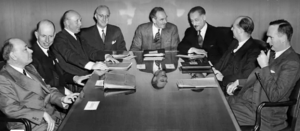The Hollow Alliance
< < Go Back
by Ian Bremmer,
The historic concord between the U.S. and Europe made the West safe and rich. Now it’s in danger of collapse.
For decades, the transatlantic partnership has been crucial to international security and the stability of the global economy. Through organizations like NATO, U.S. and European leaders have worked together to advance democracy, liberty, rule of law and the market-based values that have helped lift hundreds of millions of people out of poverty around the world. There has never been a greater alliance of capable and like-minded partners.
But today that alliance is weaker and less influential than at any other time since the 1930s. Americans and Europeans are distracted by challenges at home. Anger at government and public anxiety over the impact of globalization are on the rise. Emerging powers in Asia and elsewhere are asserting new values, and the U.S. and Europe are increasingly at odds over how best to adapt to a changing world.
Neither side seems to realize that an alliance that has been the backbone of the postwar era is crumbling. Europe is preoccupied with internal challenges like the migrant crisis, the upcoming referendum on Britain’s membership in the E.U. and ongoing disputes with Russia. In the U.S. presidential campaign, the transatlantic relationship has been less than an afterthought, overshadowed by anti-trade rhetoric.
Yet the decades-old U.S.-Europe partnership remains essential. “Globalization seems to have made the Atlantic wider, when it needs to become smaller,” says former British Foreign Secretary David Miliband. “A multipolar world does not diminish the need for transatlantic cooperation. It enhances it. From the pivot to Asia, which is necessary on both sides of the Atlantic, to the management of the global commons, shared values need to be turned into shared priorities.”
The transatlantic rift has been years in the making. In the 1990s, the war in the former Yugoslavia generated intense resentment among Americans who were frustrated that Europeans depended on the U.S. to solve European security problems. The U.S. invasion of Iraq in 2003 provoked unprecedented resistance from France and Germany. The global financial crisis stoked European skepticism of U.S.-style laissez-faire capitalism. The U.S. National Security Agency was caught spying on friendly governments, including European ones, raising fears that American Internet companies had given U.S. intelligence agencies deep access to European secrets–which led German Chancellor Angela Merkel and others to call for a European Internet walled off from the U.S.
Yet these events are symptoms, not sources, of the cancer infecting transatlantic relations. The problem is that there is no credible Cold War–scale rival to unite the U.S. and Europe in the face of a common threat. Without an existential enemy, it’s easy to imagine that it’s not worth the trouble to bring the U.S. and Europe together.
And right now it is trouble–a lot of it. After the bloody, exhausting wars in Afghanistan and Iraq, Americans have turned inward. In Donald Trump, a major political party is likely to nominate a candidate who questions the basic value of the transatlantic relationship.
The lack of a common challenge–and a common mission–is reflected in debates over the budget of NATO, the military arm of the transatlantic relationship.
Even on terrorism, a priority for the U.S. and Europe, the two sides are drifting apart. It was striking after the attacks in Paris last November that the French government turned for military support not to NATO, which is treaty-bound to defend members, but to the E.U., activating a rarely cited clause of the Lisbon Treaty that calls for help from other E.U. members. An appeal to NATO would have required a level of cooperation that French officials felt Washington was unlikely to offer quickly, and with Paris bleeding, the French weren’t prepared to wait.
The U.S. and the E.U. will never fully agree on how best to handle Russia, mainly because Europe is far more vulnerable to the trouble Moscow can start.
European wavering on Russia reveals something telling: U.S. and European values are diverging. The stark ideological choices imposed by the Cold War order obscured underlying differences in political and economic values both within Western Europe and between Europe and the U.S. Those differences are now impossible to ignore, and the post–Cold War “rise of the rest” has brought an array of competing values into the international system, from Chinese-style state-driven capitalism, to Russia’s aggressive use of energy exports as a political weapon, to protectionism as practiced in India and Brazil.
At the same time, Europe and the U.S. are experiencing individual identity crises. In Europe, the influx of mainly Muslim migrants–and the quotas for how many of them each member must accept–comes at a time of heightened public fear of Muslim terrorists, fueling the anger of European voters already disgusted with unaccountable bureaucrats in Brussels. The result is a surge in support for nationalist, anti-E.U. parties.
For many American voters, the unaccountable bureaucrats live in Washington. Trump and Bernie Sanders, populists with little experience or interest in foreign policy, have dominated the headlines, and Trump in particular has attacked what he says are free-riding allies. Both men gripe that Washington absorbs too much of the cost of NATO. Both say recent trade deals have victimized the American worker, and both are opposed to the Transatlantic Trade and Investment Partnership (TTIP), a major trade deal that American and European leaders have been pushing hard, with little traction. This tough political climate has even forced protrade Democrat and likely next President Hillary Clinton to pretend she opposes new trade deals.
From the ashes of World War II, U.S. and European leaders forged an alliance that has done more than any other in history to promote international development and individual liberty. In containing the threat of Soviet expansion, the U.S. helped defend Europe until one famous wall fell. Will Washington be there to help as new walls rise?
More From TIME Magazine:




